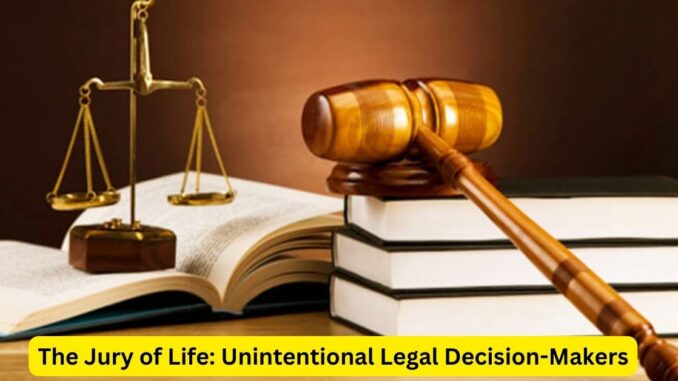
In the intricate tapestry of human interactions, decisions are constantly being made that have legal implications, often by individuals who never intended to be legal decision-makers. These everyday people, metaphorically referred to as “The Jury of Life,” inadvertently find themselves shaping the course of legal outcomes through their actions and choices. This phenomenon sheds light on the complexity of justice and the unpredictable ways it intersects with our lives.
Consider a bystander who witnesses a minor accident on the street. Their decision to provide a statement to the authorities becomes a crucial piece of evidence in determining fault and liability. In this scenario, the bystander becomes an unintentional contributor to the legal process, their account potentially influencing insurance claims or even court proceedings.
Similarly, a social media user who posts photos or comments about their daily life can inadvertently impact legal cases. In an age where digital footprints are admissible evidence, these posts can corroborate or contradict claims made in court. A seemingly harmless update might end up having significant legal implications, turning an individual into an unwitting participant in the judicial system.
Family and friends who provide character references during sentencing hearings also play an inadvertent role in legal decisions. Their words can sway judges to show leniency or impose stricter penalties. In such instances, personal relationships unexpectedly intersect with the legal realm, highlighting the interconnectedness of justice and human relationships.
Moreover, societal attitudes and opinions can inadvertently shape legal outcomes. Public opinion, often influenced by media coverage, can impact a trial’s fairness or influence the actions of jurors. These unintended influencers, members of “The Jury of Life,” reflect the broader context within which legal decisions are made, reminding us that justice is not solely confined to courtrooms.
The power of unintentional legal decision-makers also extends to institutional settings. Teachers, counselors, and healthcare professionals might unknowingly become pivotal figures in child custody battles or mental health commitments. Their observations and recommendations, grounded in their expertise, can have profound legal ramifications.
The concept of “The Jury of Life” raises the question of whether there’s a need to educate individuals about the potential legal consequences of their actions. While a formal understanding of the law might be unrealistic for the average person, a basic awareness could encourage more responsible behavior and prevent unwitting involvement in legal matters.
This phenomenon also underscores the broader issue of how legal systems interact with everyday life. As legal decisions permeate our personal and professional spheres, they emphasize the necessity of a justice system that is transparent, accessible, and adaptable to the realities of modern life.
In a world where even the most mundane actions can unintentionally influence legal outcomes, recognizing the power of “The Jury of Life” is essential. It highlights the intricate web of connections between our choices and the legal system, showing that justice isn’t solely in the hands of lawyers and judges. Instead, it’s a shared responsibility that binds us all, reminding us that the decisions we make can have far-reaching consequences beyond what we might ever anticipate.
Leave a Reply